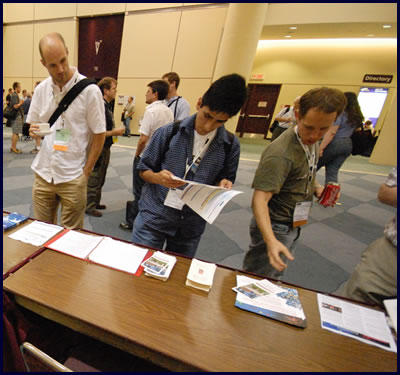| |
THE
RÉSUMÉ AND CV IN YOUR JOB SEARCH
By Joe Tringali, Tringali & Associates
The Résumé and the Curriculum Vitae (CV) are two distinct documents, each with
their own unique characteristics and each meant to capture the attention of a
specific audience. The terms are often used interchangeably, but upon closer
examination, one can see nuances that make each a better choice for different
employment application types and different readers. What follows are a few
thoughts on the résumé, the CV and which might be the better document to use for
each type of position applied to.
 Both the CV and résumé include the candidate'ss name, contact information,
education, work experience and relevant work-related skills. In general, the
résumé is shorter in length than the CV, usually running about 1- 2 pages and
geared to the first reviewer who typically is not trained as a scientist. There
are always exceptions to this rule, of course. résumé is used primarily when
applying to industrial positions and its purpose is to capture the
non-scientist's attention so that he/she moves your application forward in the
hiring process. Typically, whenever you apply to a posting through any sort of
job board or employer website, the application is forwarded to the Human
Resources staff or corporate recruiter who is screening each application for
keys words as they pertain to the job for which you have applied. The key words
may be training-related (i.e. Ph.D.) or skills-related (i.e., Java, C/C++). They
may also give an indication of how much related research experience you may be
bringing to the table, including your graduate research work or post graduate
experience. This said, as a candidate your goal is to make sure the first reader
is able to find those key words/phrases easily and quickly on the first page
your résumé so that he/she will move your application to the next level of
review by the hiring scientific department within the organization. Both the CV and résumé include the candidate'ss name, contact information,
education, work experience and relevant work-related skills. In general, the
résumé is shorter in length than the CV, usually running about 1- 2 pages and
geared to the first reviewer who typically is not trained as a scientist. There
are always exceptions to this rule, of course. résumé is used primarily when
applying to industrial positions and its purpose is to capture the
non-scientist's attention so that he/she moves your application forward in the
hiring process. Typically, whenever you apply to a posting through any sort of
job board or employer website, the application is forwarded to the Human
Resources staff or corporate recruiter who is screening each application for
keys words as they pertain to the job for which you have applied. The key words
may be training-related (i.e. Ph.D.) or skills-related (i.e., Java, C/C++). They
may also give an indication of how much related research experience you may be
bringing to the table, including your graduate research work or post graduate
experience. This said, as a candidate your goal is to make sure the first reader
is able to find those key words/phrases easily and quickly on the first page
your résumé so that he/she will move your application to the next level of
review by the hiring scientific department within the organization.
One way to accomplish this is to include a skills section, listing any and all
appropriate technical tools at your disposal that have either been asked for in
the job posting, or that you feel may be relevant to the role, given the nature
of the role. This list can be modified with each application so that it reflects
your skills that the reader is hoping to see (but never at the expense of
falsifying your qualifications, of course).
Alternatively, the CV is typically a lengthier document (usually 2-4 pages) and
includes a summary of academic background as well as teaching and research
experience, publications, presentations, awards, honors, affiliations and any
other related details. This document is used primarily when applying for
academic, teaching, and scientific/research positions in an institute, or when
applying for fellowships and/or grants. In these settings, the first reviewer of
your application is most often a trained scientist, serving as a faculty member,
Department Chair, Principal Investigator, or search committee member. This
screener will be reviewing your CV well beyond the key word search method,
eliminating the need to include such a section on page one, although you may
want to include it later in the document. The screening scientist is more
interested in the graduate program you are completing, the nature/quality of
your publications, and your research interests and how they may dovetail with
the activities in his/her lab.
Simply put, if you as a candidate suspect that the first reviewer will be a
Scientist, your application may be best served by submitting a full CV rather
than a résumé. If, however, you are applying to industrial positions and are
asked to send your résumé to a generic email address such as
careers@abcbiosciences, you may assume that the first reader is not a scientist
and that a résumé is probably the better document to use.
The motivated candidate will have a version of both the CV and the résumé at
their disposal and will feel good about the content and format of each document.
Remember that neither the CV nor the résumé alone will get you the job
offer...their only purpose is to draw interest to you as a candidate for
subsequent discussions.
Good luck in your current or upcoming job search!
 |

